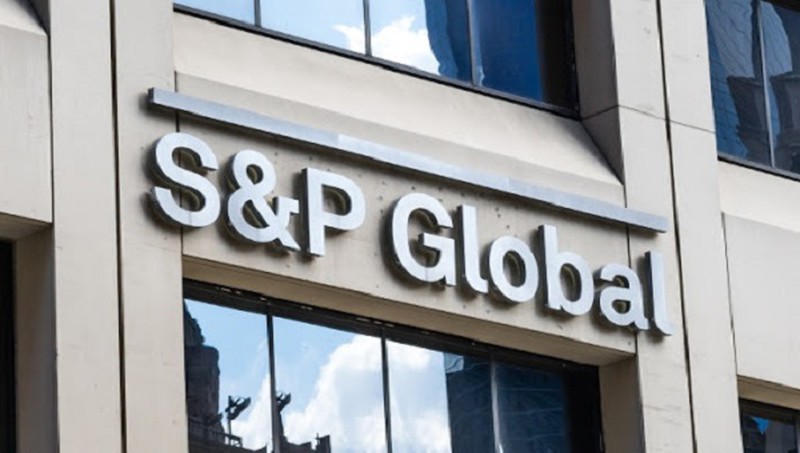Vietnam’s long-term credit rating upgraded to “BB+”: S&P
S&P forecast Vietnam’s GDP will grow 6.9% in 2022 before settling closer to its long-term trend of growing 6.5%-7% from 2023 onward.
S&P Global Ratings on May 26 raised its long-term foreign and local currency sovereign credit ratings on Vietnam to 'BB+' from 'BB'.
| S&P expects Vietnam's economy to continue its upward trend. Source: S&P |
The rating agency also affirmed the country’s short-term rating at ‘B’ with a stable outlook.
“The stable outlook reflects our expectations that over the next 12-24 months, Vietnam's economy will continue to recover from the challenges posed by the pandemic over the past two years. This will support the external position and rein in fiscal deficits,” it noted.
S&P added it could raise the ratings if Vietnam's institutional settings improve considerably, in ways that augment policy predictability and transparency.
Such favorable changes in the policy environment could bolster investor confidence in the country's economic and financial stability, stated S&P.
Meanwhile, the sovereign ratings on Vietnam also reflect S&P’s view of improvements in the government's administrative processes. In recent years, the government had implemented measures that helped to close the gap on lapses in repaying guaranteed debt.
The rating upgrade is supported by Vietnam's robust economic prospects and sound external position. Vietnam continued to attract strong foreign direct investment (FDI) flows, despite pandemic disruptions.
These strengths are balanced against Vietnam's modest GDP per capita, legacy banking sector weaknesses, and evolving institutional settings, exemplified by the centralized decision-making process and rigid bureaucracies around public investments.
Bright outlook
Vietnam's economy is back on track to recovering following disruptions from a surge in Covid-19 cases last year. The strict lockdown in the second half of 2021, particularly around economic zones, resulted in real GDP growth slowing to a record low of 2.6% from 2.9% in 2020. Two consecutive years of subpar growth provide a favorable base for an economic rebound this year.
As vaccination rates increase, the government has announced a shift away from the zero-Covid policy. The progressive removal of domestic and border restrictions to usher in tourists should further support the economic rebound this year.
Vietnam's GDP per capita has risen quickly in the past few years from a relatively low base. A recent re-evaluation of the country's official nominal GDP--meant to better capture activity from emerging industries--led to an upward revision by more than 20% over the revised period.
“We forecast real GDP will grow 6.9% in 2022 before settling closer to Vietnam's long-term trend of growing 6.5%-7% from 2023 onward,” stated the S&P, adding the GDP per capita in 2022 could reach US$3,868.
Vietnam's economy is increasingly well-diversified, with a booming manufacturing sector that is largely funded by FDI. The country's attractiveness as a premier destination for FDI in Southeast Asia, along with its young, increasingly educated, and competitive workforce should help to keep the country's long-term development trajectory intact despite temporary labor market disruptions from Covid-induced lockdowns.
Vietnam's macroeconomic stability has supported the manufacturing sector's attractiveness for global firms in the electronics, mobile phone, and textiles industries. The FDI-oriented segments continue to fuel stronger domestic activity, with better employment opportunities and higher wages powering robust private consumption growth. The resilience of these growth drivers is demonstrated in macroeconomic data from the first quarter, which showed exports growing 5.1% and the consumption increasing 4.3% from a year ago.
S&P expects Vietnam's 10-year weighted average growth of real GDP per capita to be approximately 5.7%, significantly higher than the average of the country's peers at a similar income level.
Pandemic developments remain unpredictable, although Vietnam's high vaccination rate may help mitigate the impact of potential Covid waves on the healthcare system in the future.
Risks to economic growth are tilted toward the downside because Vietnam's export-led economy relies on strong external demand. Rising inflation and financing conditions, as well as geopolitical risks, could dampen global growth and reduce demand for Vietnamese exports. Additional risks to Vietnam's economy include the condition of its financial sector, which is characterized by low levels of capitalization and mixed asset quality, which has deteriorated during the pandemic.












